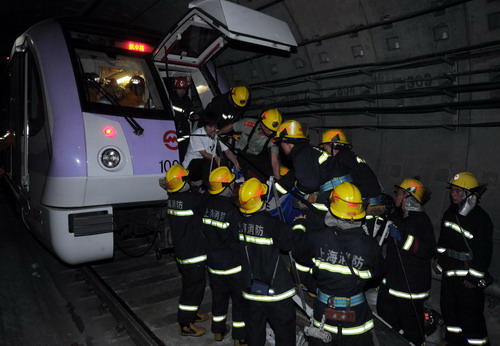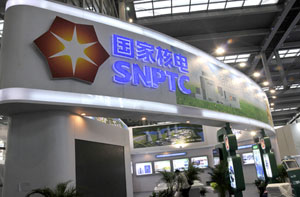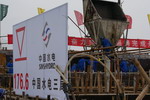Accidents a red signal for metro expansion
Updated: 2011-09-29 11:22
By He Na (China Daily)
|
|||||||||||
|
 |
|
Rescue personnel evacuate passengers trapped in a train carriage. Xinhua News Agency said most of the injuries were bruises and broken bones, with some external head traumas. [Photo/Xinhua] |
"One serious problem I have observed is copycat subway designs. The plans from design institutes for different cities are more or less the same in route layout, structural design, construction period and method," Wang said.
There can be no shortcuts in planning and design, he said: A scientific plan must be based on extensive research that takes diverse geological conditions into account. Copycat designs, he warned, will inevitably waste public resources, damage the environment and cause accidents.
But competition over subway construction is fierce among Chinese cities, each hoping for faster approval and the fastest construction. Who wants to waste time in planning design? Wang asked.
"When I visited Wuhan city, I heard so many complaints from citizens," he said. Subway construction in many sections there could have been done through tunnels dug underground, but for the sake of speed, builders instead used "the cut-and-cover method, which led to more traffic jams and tasks for demolition."
Zhang Yan, the civil engineering official, noted that it is much more difficult to do the construction underground than on the surface, and harder still to redo the work or correct construction problems. Thus the need for comprehensive planning above ground and below.
Zhang also said that talent is vital to subway safety, and China's supply of well educated professionals, mature technical workers and skilled operation managers is spread too thin. It can't keep pace with subway expansion, he said, and could result in future accidents.
A matter of pride
Wang, the underground engineering specialist, is 73, and he said he has quit trying to count the meetings he has attended on subway feasibility studies this year alone. But there is a consistent theme among them, he said.
City officials consider a subway system to be the mark of a "real" city, and they would feel ashamed if their cities had no subways. "Most of them are pursuing subway kilometers."
Even if they aren't needed.
"I participated in some feasibility meetings and found that the subway layout of some cities extends to sparsely populated areas that are all farmland," Wang said. "Do they have traffic jams there? Are the subways there useful in reducing traffic in the city center?
"For medium-sized cities, high-tech bus rapid transit is highly recommended. It seems to be as efficient as a subway but at only 5 percent of the cost to build," Wang said.
"It would be a waste" to build subways in some of those cities, said Zhang Ming, a professor at Renmin University of China. "It's necessary for some cities to build subways to relieve traffic congestion, but it needs to build in accordance with local conditions."
The current cost of constructing one kilometer of subway line averages 400 million to 500 million yuan ($62.5 million to $78.1 million). In complex geological conditions, it could reach 700 million yuan.
"The high cost of maintaining the subway requires huge government investment and high fares the public can hardly afford, and those factors could doom subway operation," Zhang said.
"Nowadays, many places rush to carry out construction like a swarm of bees," he said. "Due to the insufficient precision of research beforehand, the operating result is not satisfactory, and that is another kind of waste."
Quality control
Wang also highlighted a serious issue in the construction industry.
"In a bid to keep the construction cost down, it is often the company that bids the lowest price and most favorable terms that will win the contract." That is common worldwide. The main contractor often farms out parcels of work to subcontractors, which is also common.
But at each lower level, there can be a drop in engineering requirements, quality standards and construction technology. And without security and strong management systems in place, Wang said, safety is threatened.
He called for the introduction of overall contract responsibility for design and construction, and the use of comprehensive budgets for the subway construction. Both systems would enroll the various elements - planning, design, construction and maintenance - that are seldom well coordinated now.
"One subway line allows only one contractor, which is required to be responsible for the project forever," Wang said. A comprehensive planning and contract system "could effectively balance the interests of all parties and greatly prevent the waste of resources and energy and increases in design cost".
The two subway lines in Nanjing just adopted such a system and the results were very good, he said.
Wang noted the central government's call for the scientific concept of development, and said subway construction needs to comply. We need not only speed, he said, but also guaranteed high quality.
Zhang Yan, the civil engineering official, noted that construction of China's first subway line was completed in 1969, and there has been considerable progress and development since then. "However, compared with the century-long history of subways overseas, we still have a lot to learn, especially the legislative field."
He said that subway construction standards need to be strengthened, made more comprehensive and set into law as soon as possible.
Zhang Ming, the Renmin University professor, said governments play major roles in subway construction abroad as well as at home. "But the difference is, in domestic subway planning and design problems, we have not given enough chance to the public to participate."
Related Stories
Xi'an opens first subway line 2011-09-16 17:36
Escalators for new Beijing subway line recalled 2011-08-02 15:04
China CNR signs subway contract with MTR 2011-07-23 13:40
Subway accident a lesson 2011-07-09 11:26
- China expands lending to fund-hungry small firms
- '9% GDP growth' for 2011
- Self-sufficiency in ore to pass 50%
- Citic Securities raises $1.7b in HK
- Foreign pilots call for better safety systems
- Crunch comes for those with underground loans
- Mayor sorry for demolition death
- Minimum wheat purchase prices raised for '12













